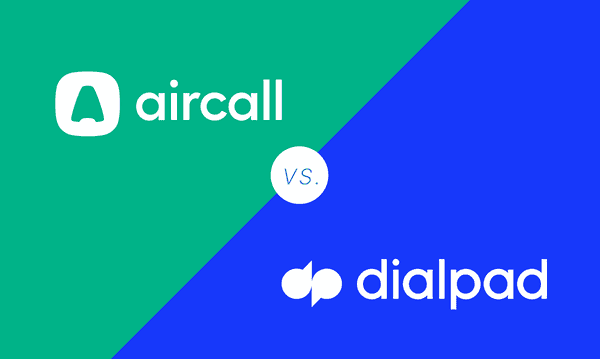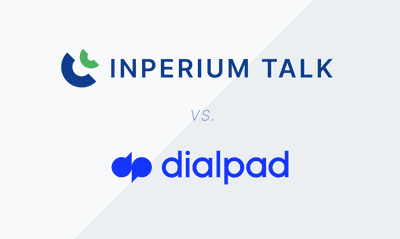Dialpad vs Aircall; What You Should Know Before You Buy
VoIP is the future of business communications. It is cheap, flexible, and infinitely scalable, plus it comes with a wide range of features that is not accessible on traditional phone systems. In this series of blog posts, we compare a variety of VoIP providers to help you choose the right solution for your business.
6 min read

Tatiana Ogurtsovskaia
Jul 21, 2021

VoIP, Voice over Internet Protocol, is a vital part of your business operation; the right provider can increase productivity for your team and enhance the customer experience. However, as every business is unique with different needs and budgets, when selecting a VoIP service for your business, there are several factors that you need to consider.
Below, we will do a competitor analysis looking at the key differences between two competing cloud-based services, Dialpad Talk and Aircall. Analyzing their user experience, features, functionality, integration capabilities, and pricing, to help you select the best business phone system for your organization.
What Is Dialpad Talk?
Dialpad is a cloud-based unified communication system consisting of a business phone system, inbound contact center, outbound contact center, and video conferencing platform. Each product is paid for separately; however, you can get a solution that combines all products. Dialpad’s solutions offer a lot of features and functionality.
What Is Aircall?
Aircall is a VoIP system built to be quickly deployed, simple to manage, and easy to scale. Aircall is focused on supplying an inbound and outbound contact center solution that is entirely cloud-based. In addition, Aircall is designed to support modern businesses by integrating with over 40 different business and CRM platforms for a seamless experience.
Dialpad vs Aircall
When planning on getting a new business phone system or upgrading your old legacy system, it is important to map out your requirements. Knowing what your business needs in order to grow will help you to pick the right VoIP solution for you.
While there are a number of players in the VoIP solution space, we are going to look in-depth at Dialpad and Aircall. Both solutions are designed to be easy-to-use solutions that cater to SMBs.
User Interface and Ease of Use
Both Dialpad Talk and Aircall are designed with interactive user interfaces. However, while both providers state that they are easy-to-use platforms, that are straightforward to navigate, reviews show that Dialpad can be quite confusing and overwhelming for users, even those who are considered to be tech-savvy.
Setting up Dialpad is as simple as using your existing email address, although you will need to provide your credit card details, even for the trial. Dialpad supports existing PBX hardware and provides apps for mobile phones and desktops, with all you need to do to make calls is by logging into your account. For Aircall, to set up an account, you need to use a company email address; personal emails will not be accepted. While Aircall’s web portal allows you to access the dashboard and do any administration work, you need to download the Aircall’s call dialer app to your desktop in order to make calls.
Feature Rich Solution
Dialpad and Aircall, both offer a variety of features that are designed to cater to the needs of SMBs. While they share some key similarities, such as call recording, call transfer, call conferencing, IVR, toll-free numbers, business hours, and access to call tracking metrics, there are fundamental differences between the two providers’ functionality.
Dialpad features provide a unified business communication designed to support collaboration amongst internal and remote teams. These features support calls, videos, messages, emails, and web conferencing. Some of Dialpad’s features include visual voicemail, web conferencing, and video calls. Dialpad also uses AI-powered voice intelligence to automatically transcribe calls and analyze them, providing key insights, notes, and automatic call summaries.
Aircall’s features are designed to support a robust and intelligent phone system and are best for supporting call and support centers. The features are designed to optimize the customer call experience and improve efficiency for call center agents; these call features include three-digit extension numbers, shared call inboxes, call whispering, call comments, and time and skill-based routings.
Integrations with Third-Party Platforms
While both Dialpad and Aircall are supported on Windows, Mac, Android, and iOS, their integrations with third-party platforms differ significantly.
Dialpad’s main integrations and the only two available on the lowest plan are with Office 365 and GSuite. Upgrading Dialpad’s plan to the Pro or Enterprise will give you access to the below integrations:
- Azure (Enterprise Only)
- HubSpot
- OneLogin (Enterprise Only)
- Okta (Enterprise Only)
- Outreach
- Salesforce
- Slack
- ServiceNow
- Zendesk
Aircall offers more integrations than Dialpad. Regardless of what plan you are on; you can have access to up to 60 integrations. Some of the integrations Aircall offers include:
- API and Webhooks
- BigCommerce
- Freshsales
- Freshdesk
- Gong
- HubSpot
- Klaus
- MaestroQA
- Microsoft Teams
- Microsoft Dynamics
- Outreach
- Pipedrive
- Rippling
- Salesforce (Custom and Pro)
- Shopify
- Slack
- SugarCRM
- Zendesk
- Zoho
Plans & Pricing
Dialpad Talk offers different plans, with discounts available if you are billed annually.
- Standard: at $20 per user per month ($15 if billed annually), 1 license minimum
- Pro: at $30 per user per month ($25 if billed annually), with 3 license minimum
- Enterprise: pricing available on request, with 100 licenses minimum. Along with Dialpad Talk, you can pay an additional $15 per user for Uber Conferencing, $95 for Dialpad Sell, as well as Dialpad Support, however, pricing is only available on request.
Aircall has three pricing tiers, again with discounts if billed annually:
- Essentials: at $40 per user per month ($30 if billed annually), 3 users minimum, and maximum 3 teams
- Professional: $70 per user per month ($50 if billed annually), 3 users minimum and unlimited teams
- Custom: pricing available on request, unlimited teams
Both Dialpad and Aircall solutions on initial review, appear to be reasonably priced; however, as they only offer unlimited phone plans, as your business grows and the size of your team increases, both solutions can end up being quite expensive. Unlimited phone plans mean that you have to pay the same price per employee, even for those who need less minutes and barely use the phone.
Between the two, Aircall ends up being better value for small businesses and startups as they offer a more feature-rich solution on the basic tier. Dialpad’s entry point may only be at $15, which is less than Aircall at $30; the pricing can get significantly more expensive as you add on Dialpad Support, Uber Conference, and Dialpad Sell. However, Dialpad offers a more flexible solution offering monthly billing rather than annual with the option to cancel at any time.
The Verdict
All in all, both these systems are feature-rich solutions for SMBs. While Dialpad has built-in a wide range of native functionality, including video conferencing and AI capabilities, Aircall has taken the approach of integration with a wide range of external partners. Aircall is more affordable for small businesses, with access to more features on the basic plan.
Both solutions will provide you with a comprehensive VoIP solution; which one you choose will depend on the needs of your business. Dialpad is a unified business communication system that offers more flexibility for collaboration amongst internal and remote teams, whereas Aircall is the best fit for a sales-centric contact center.
Ultimately, either way, you look at it, both Dialpad and Aircall are top contenders as VoIP providers, but the downside is that they are both quite expensive to run, making them unaffordable for many SMBs. If you are tired of paying for unlimited phone plans for employees who don’t need to use the phone all day and looking for a solution that will tailor packages to your business needs, you can also check out Inperium Talk.


